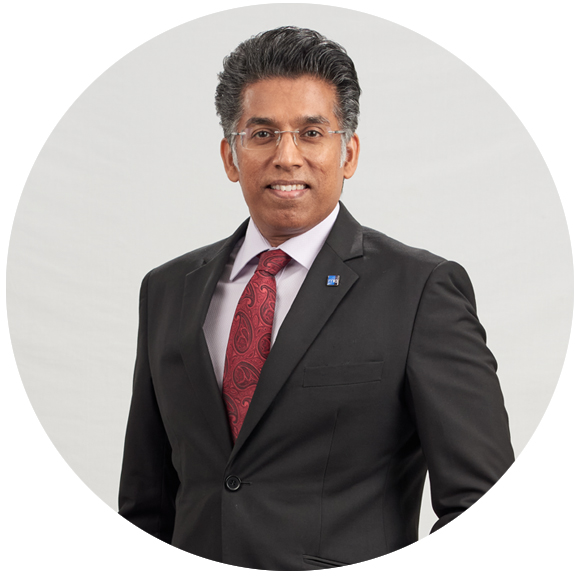The Malaysian Institute of Accountants (MIA) has appointed G Shanmugam (G Shan) as its Chief Executive Officer, effective 1 September 2025. A Chartered Accountant of MIA, Fellow of the Chartered Institute of Management Accountants (FCMA), Chartered Global Management Accountant (CGMA), and ASEAN CPA, G Shan assumed the Acting CEO role in March, succeeding Dr Wan Ahmad Rudirman Wan Razak.

Notably, G Shan is a product of the Institute, having grown alongside MIA’s transformation since joining the Institute nearly two decades ago. Prior to his appointment as acting CEO and then CEO, G Shan served as the Executive Director of Strategy and Development, exercising oversight over MIA’s strategy, systems, methods, communications, branding, and continuing professional development. His milestones include introducing new approaches to CPD, strengthening high-level engagements and branding, and building value partnerships to reinforce financial sustainability.
Commenting on the appointment, MIA President Dato’ Seri Dr Mohamad Zabidi Ahmad said: “Mr G Shan exemplifies the flexibility and agility of the accountancy profession. Since joining MIA in 2007, he has merged his expertise in financial and business management, strategic planning, consulting, training and development in delivering innovative and sustainable value to the Institute and the profession.”
With his appointment, attention now turns to MIA’s aspirations under his leadership. Members and stakeholders are keen to understand how the Institute will navigate the next phase of growth, from AI adoption and sustainability to legislative reform and talent development. In this feature, the Accountants Today team speaks to G Shan on MIA’s priorities and vision for strengthening the profession’s future relevance.
A Purpose-Driven Organisation
Aligned with MIA’s nation-building mandate, G Shan frames the Institute’s mission in national terms. “If I am appointed as CEO of a private company and I fail, only the company fails. But MIA has a national duty — if MIA fails, we fail the nation.”
This sense of responsibility requires clarity of purpose and strategic direction. “We must enable a purpose-driven organisation. That means focusing on talent, regulation and development to ensure the profession continues to serve the public interest.”
MIA’s mission is also aligned with the global sustainability agenda, particularly the United Nations Sustainable Development Goals (SDGs). The Institute emphasises SDG 16 (Peace, Justice and Strong Institutions), which prioritises accountability and robust regulation, and SDG 17 (Partnerships for the Goals), which calls for collaboration to strengthen institutions and drive sustainable growth.
The Profession at a Tipping Point
G Shan believes the profession is at an inflection point. “The profession is at a very interesting tipping point. Those who know how to embrace technology, particularly AI, will become superstars. Those who don’t risk becoming dinosaurs.”
He emphasises that technology is an enabler rather than a threat. “AI will not replace accountants, but accountants who use AI will replace those who don’t. The speed of AI adoption is mind-boggling. Tasks we once did manually over days can now be completed in minutes — but only if accountants embrace these tools.”
AI, he says, is fundamental to keeping the profession adaptable and future proof. “Professional judgement, accountability and interpretation must still come from humans — that is where the value of accountants lies.”
Embracing Technology and AI
Accelerating technology adoption among members remains a priority for MIA. MIA’s Initiatives such as the Digital Technology Adoption Awards (DTAA), the MIA AI Advisory Group, and the MIA Accounting and Financial Technology Showcase (MIA AFT) along with a series of technology focused CPD programmes offered to members are designed to encourage members to integrate digital tools into their work.

G Shan also highlights the need for MIA itself to embrace a digital-first culture. “Technology must also transform MIA. We need to further modernise processes, leverage generative AI and ensure that our communications project authority, professionalism and pride in membership.”
The objective is to enhance organisational productivity and member support. In practice, this means faster processing, focused and targeted communications, and a more connected ecosystem that reflects the digital realities of business.
Building Future-Relevant Talent
Talent development is another key priority. “Our overarching goal is to ensure our talent remains future relevant — continuously adding value through upskilling, reskilling and embracing future skills.”
At the Institute level, succession planning is equally critical. “We must have a robust succession plan. We cannot afford leadership vacuums, especially in an organisation with national responsibility.”
G Shan stresses the importance of inclusivity in building MIA’s culture and performance. Management is considering a proposed townhall series with staff to promote openness, alignment and collaboration across the Institute. “Leadership must go beyond command to create safe spaces where ideas are shared and ownership is built collectively.”
This inclusive approach extends beyond MIA’s workforce to the wider profession, from students and young accountants to public accounting organisations (PAOs) and regulators. “We must take an inclusive approach to stakeholder engagement — members, students, young accountants, PAOs, higher learning institutions, associations, employers and regulators — to bring everyone on board for the future.”
Strengthening Regulation and Advocacy
G Shan underscores the importance of the pending amendments to the Accountants Act. “Amendments are essential to strengthen regulation and address long-standing issues such as bogus accountants.”
MIA advocates a balanced approach that integrates regulation and development — robust rules on one hand, strong member support on the other. “Regulation and development must go hand in hand.”
Advocacy will continue to be central to MIA’s strategy. G Shan stresses the importance of closer high-level engagement with ministries, regulators, industry bodies and regional peers. “Collaborative leadership is not only about internal alignment but also about building trust and influence through strong external relationships.”
Sustainability and Nation-Building
Beyond regulation and technology, sustainability is another cornerstone of MIA’s agenda. The Institute has consistently emphasised the role of accountants in enabling sustainability reporting and assurance, climate-related disclosures and integrated thinking.

“Accountants sit at the intersection of business strategy, governance and reporting. By equipping members with sustainability knowledge and frameworks, MIA can support Malaysia’s transition to a greener, more resilient economy. This also links back to nation-building: ensuring that the profession is not only future proof but actively contributing to Malaysia’s competitiveness in a fast-changing global landscape.”
Collaborative Leadership in Practice
Throughout his career, G Shan has leaned on collaboration as a strategy. From building value partnerships in professional development to working with regulators and PAOs, his leadership style is to engage, connect and build consensus.
This collaborative approach underpins MIA’s advocacy. By engaging stakeholders at the highest levels, the Institute can strengthen its role in shaping policy, championing sustainability and driving future readiness.
Beyond Work
Away from the office, G Shan finds balance through reading, fitness and music. A regular at the gym and a keen music enthusiast, he credits these pursuits with helping him stay grounded, disciplined and creative.
Looking Forward
Well regarded by members for his competence and approachable style, G Shan now shoulders the responsibility of steering MIA into its next chapter. The challenges ahead are clear: accelerating technology adoption, embedding sustainability, strengthening regulation, and ensuring the profession remains future relevant, resilient and adaptable.
“Change doesn’t happen overnight, but we must act now to remain future relevant,” he stresses.
Backed by a purpose-driven vision and collaborative leadership, G Shan believes that MIA is poised to chart the next phase of growth for the profession it serves — ensuring future relevance while contributing to sustainable nation-building.







